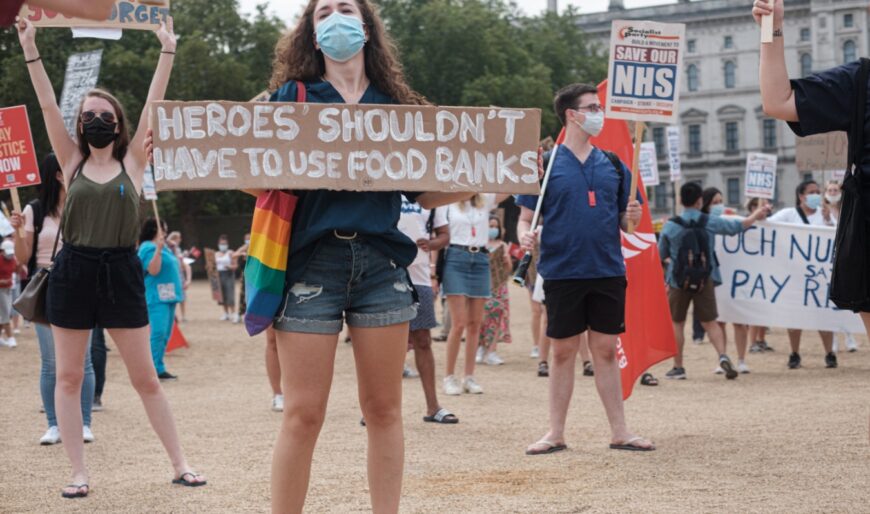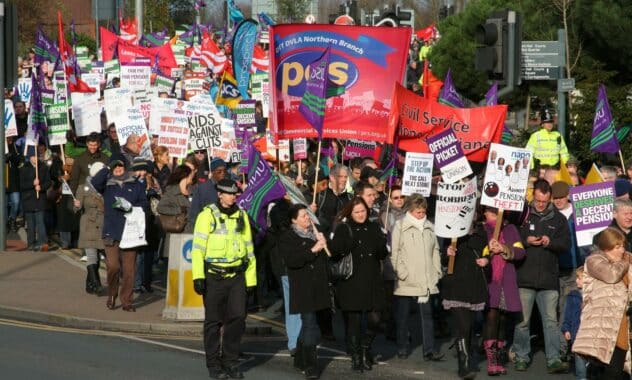Unions warn Ministers that a vast exodus of essential workers is inevitable without higher pay
TUC reports that average real-terms pay in the public sector was down £81 per month in January 2022 compared to the previous year.

According to a UNISON report released this week, thousands of low-paid NHS workers, including 999 call operators, healthcare assistants, medical secretaries, and cleaners, are at risk of leaving for the private sector.
Supermarkets, coffee shops, and logistics companies are among the businesses that are advertising pay higher than the NHS’s lowest hourly rates.
According to Incomes Data Research (IDR), Morrisons pays a minimum of £10 per hour, compared to £9.49 for a hospital porter or catering assistant. Amazon pays a minimum of £11.10 for some permanent staff.
According to UNISON, ‘golden hellos’ worth £1,500, overtime supplements of an extra £2 per hour, and staff discounts are among the incentives offered by private firms that are proving increasingly appealing to demoralised health workers.
The IDR report warns that improvements to basic pay in the private sector represent ‘a much greater recruitment and retention challenge to the NHS than previously’.
Next month, the national minimum wage will rise to £9.50 an hour. This has forced the Government to draw up measures to keep NHS pay rates within the law until the 2022 pay award is announced.
UNISON says an exodus of even more workers to the private sector would be disastrous for the health service. The NHS has an ongoing staffing crisis, soaring patient waiting times and is struggling to reduce the backlog of procedures and treatments cancelled during the pandemic.
The IDR report compared wages for jobs at the bottom of the NHS pay scale (bands 1-4)* with those in the private sector requiring similar skills and responsibilities.
The report concludes: “In the public sector, rising inflation means that the gap between pay rises there and those in the private sector is likely to widen again.
“If the Government does not act to narrow this gap, then [the NHS] is likely to face many of the problems around staff recruitment, retention and morale that arose in the past.”
With inflation at a 30-year high, no extra funding for public services in the Spring Statement, and the Chancellor stressing the need for public spending discipline, UNISON says the report is a wake-up call to Ministers.
The union is calling for an above-inflation pay rise, the real living wage of £9.90/£11.05 an hour as the minimum rate across the NHS, and other urgent measures to retain staff.
Commenting on the report, UNISON head of health Sara Gorton said:
“It’s clear big-name employers who compete with the NHS for staff are acting fast.
“The health service can’t function without cleaners, porters, healthcare assistants and other low-paid workers. But no one would blame them for taking jobs with employers willing to pay better rates.
“The chancellor’s spring statement was silent on public sector pay. But the staffing crisis will deepen unless the government acts swiftly with a real pay rise that leaves inflation in the shade.
“Workers will then have no choice but to go after better rates on the high street as the cost-of-living crisis continues to bite. That doesn’t bode well for patient care.”
The TUC have recently reported that average real-terms pay in the public sector was down £81 per month in January 2022, compared to the previous year. TUC general secretary, Frances O’Grady, told the Observer that public sector employees had worked during the pandemic “through the most intense days of their working lives”, further adding:
“We have been holding meetings of public sector workers with their MPs. Many of them were not able to hold the tears back as they spoke up about how hard it has been at work, and how hard it is at home trying to make ends meet.
“The danger now for the whole nation is that we are at a tipping point. Many public sector workers across services like health, education and social care say they don’t know if they can take it any more. If they don’t at least get a proper pay rise and help to reduce workloads, it will be the final straw.
A mass exodus would send shockwaves through every community, and it would damage our economy too. Ministers must be much more alive to this danger. They cannot let it happen.”







